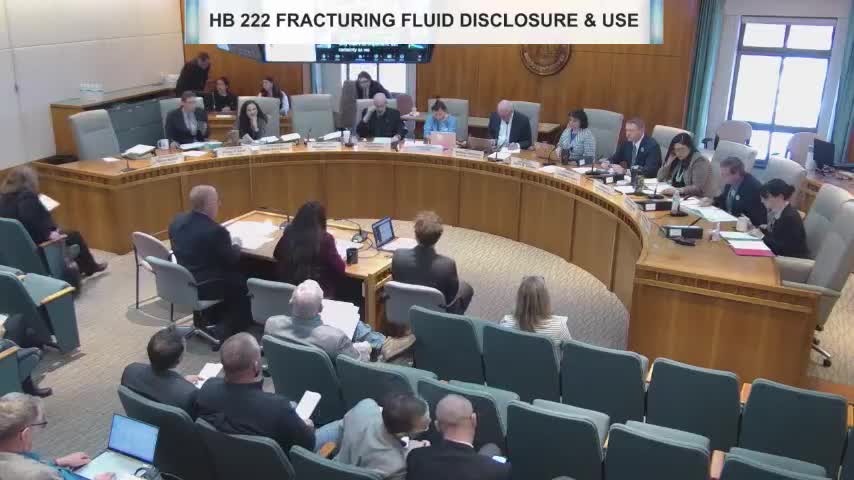Lawmakers hear bill to ban PFAS in fracking and require pre‑permit chemical disclosure
Get AI-powered insights, summaries, and transcripts
Subscribe
Summary
A legislative hearing on House Bill 222 focused on banning PFAS in oil‑and‑gas operations and requiring companies to disclose chemicals before receiving drilling permits. Supporters said the public has a right to know; industry groups warned of trade‑secret and implementation problems. The committee rolled the bill for further work.
Representative Romero introduced House Bill 222 to the House Energy, Environment & Natural Resources Committee on Saturday, saying the measure would require chemical disclosures for non‑fracking downhole operations and ban PFAS in fracking fluids.
The bill’s sponsor, Representative Romero, told the committee the measure “is a public’s right to know” and would require pre‑permit disclosure of fracking chemicals rather than the current practice of reporting to FracFocus 45 days after drilling. Senator Steinborn, appearing as a co‑sponsor, said the bill is “foundational” for how New Mexico manages produced water and contamination risks and argued the law would help communities and first responders know what they might face in spills or leaks.
The bill drew sharply divided testimony. Industry groups including the New Mexico Oil and Gas Association and the Greater Albuquerque Chamber of Commerce urged the committee to oppose the bill, saying it is too broad and could conflict with ongoing agency rulemaking and the state’s trade‑secrets protections. Ashley Wagner of NMOOGA said removing FracFocus as the primary disclosure tool and forcing new reporting at the state level “could result in older, less safe chemicals being used” to preserve trade secrets.
Environmental and public‑health advocates, including WildEarth Guardians’ attorney Tim Davis and witnesses from Sierra Club, Center for Biological Diversity and community groups, urged the panel to approve the bill. Davis cited a Physicians for Social Responsibility analysis of FracFocus disclosures that, he said, found PFAS compounds were reported in New Mexico fracking between 2013 and 2022 and that many disclosures list “trade secret” in place of chemical identifiers. “We don’t know what’s being injected into the ground in New Mexico,” he said. Supporters argued the measure would close gaps that leave communities and first responders blind to chemical hazards.
Committee members pressed sponsors on legal and practical concerns. Representative Rosanna Murphy asked where PFAS is used in the industry; sponsors and experts said the state record shows some historic use but that trade‑secret reporting obscures the full picture. Several members asked why the bill singled out oil and gas rather than a broader PFAS ban across sources; sponsors said the industry’s large volumes of injected water make it a logical initial focus. The committee also discussed whether the Environmental Department (OCD) and other agencies had been consulted and whether statute‑level changes would preempt or duplicate rulemaking.
Public testimony and sponsor exchanges emphasized two recurring points: supporters said disclosure and a PFAS ban would protect public health and enable reuse of produced water with confidence; opponents warned of legal exposure under trade‑secret law and of potential economic impacts. The sponsor said the bill would not force companies to reveal trade secrets; rather, it would require that any chemical used in New Mexico be disclosed or not used here.
Outcome: The committee agreed to “roll” the bill for further work rather than move it forward at the hearing. No formal committee action was recorded on the bill at today’s session.
Why it matters: Backers say the bill fills a perceived gap in oversight of produced water and non‑fracking downhole chemical uses; opponents say it risks legal challenges and could disrupt ongoing agency rulemaking. The measure is likely to be revised before returning to committee.
